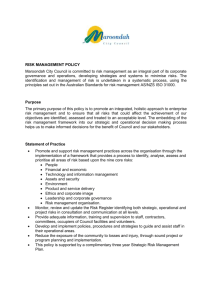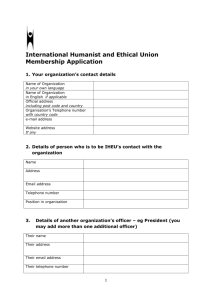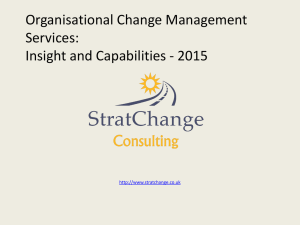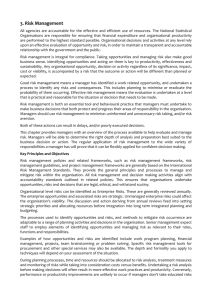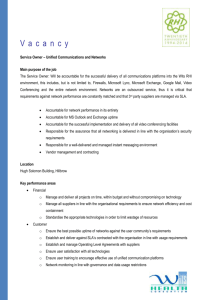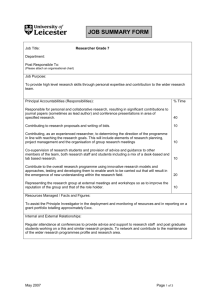Chapter 2 Jackey This chapter provides managers with an overview
advertisement
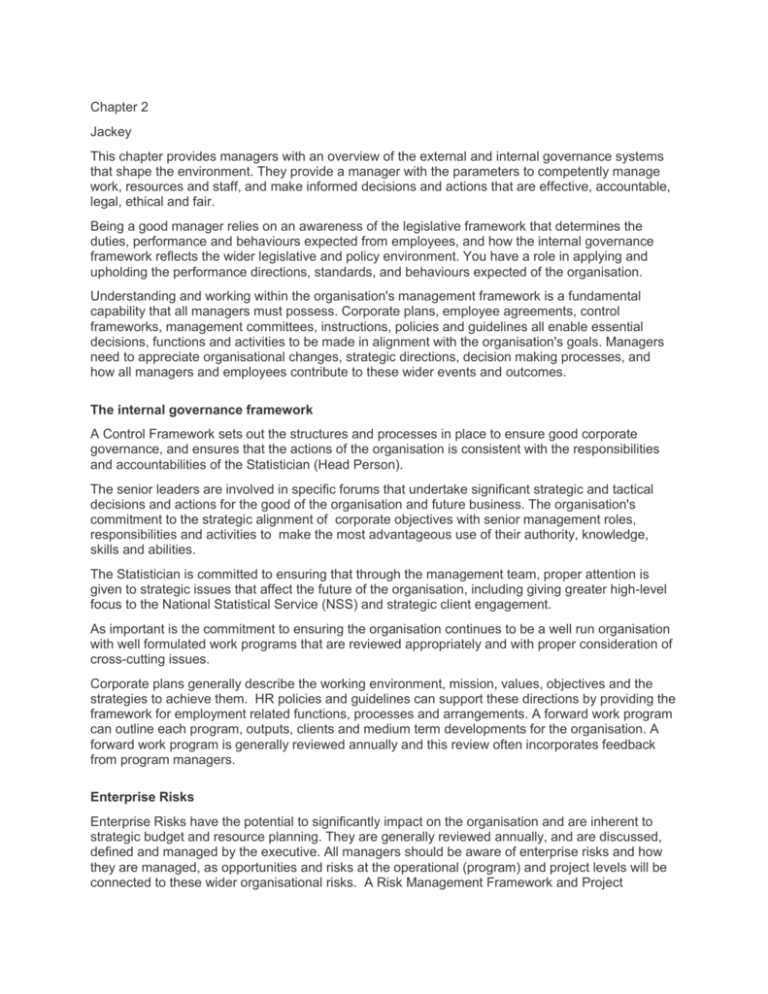
Chapter 2 Jackey This chapter provides managers with an overview of the external and internal governance systems that shape the environment. They provide a manager with the parameters to competently manage work, resources and staff, and make informed decisions and actions that are effective, accountable, legal, ethical and fair. Being a good manager relies on an awareness of the legislative framework that determines the duties, performance and behaviours expected from employees, and how the internal governance framework reflects the wider legislative and policy environment. You have a role in applying and upholding the performance directions, standards, and behaviours expected of the organisation. Understanding and working within the organisation's management framework is a fundamental capability that all managers must possess. Corporate plans, employee agreements, control frameworks, management committees, instructions, policies and guidelines all enable essential decisions, functions and activities to be made in alignment with the organisation's goals. Managers need to appreciate organisational changes, strategic directions, decision making processes, and how all managers and employees contribute to these wider events and outcomes. The internal governance framework A Control Framework sets out the structures and processes in place to ensure good corporate governance, and ensures that the actions of the organisation is consistent with the responsibilities and accountabilities of the Statistician (Head Person). The senior leaders are involved in specific forums that undertake significant strategic and tactical decisions and actions for the good of the organisation and future business. The organisation's commitment to the strategic alignment of corporate objectives with senior management roles, responsibilities and activities to make the most advantageous use of their authority, knowledge, skills and abilities. The Statistician is committed to ensuring that through the management team, proper attention is given to strategic issues that affect the future of the organisation, including giving greater high-level focus to the National Statistical Service (NSS) and strategic client engagement. As important is the commitment to ensuring the organisation continues to be a well run organisation with well formulated work programs that are reviewed appropriately and with proper consideration of cross-cutting issues. Corporate plans generally describe the working environment, mission, values, objectives and the strategies to achieve them. HR policies and guidelines can support these directions by providing the framework for employment related functions, processes and arrangements. A forward work program can outline each program, outputs, clients and medium term developments for the organisation. A forward work program is generally reviewed annually and this review often incorporates feedback from program managers. Enterprise Risks Enterprise Risks have the potential to significantly impact on the organisation and are inherent to strategic budget and resource planning. They are generally reviewed annually, and are discussed, defined and managed by the executive. All managers should be aware of enterprise risks and how they are managed, as opportunities and risks at the operational (program) and project levels will be connected to these wider organisational risks. A Risk Management Framework and Project Management Framework can provide governance for risk taking in an organisation. This is discussed more fully in the Risk Management chapter. A manager is accountable for financial expenditure, budget management and resource use. All staff have a role to play in maintaining the directions set through the governance framework. Underpinning and supporting the framework are organisational policies, procedures and guidelines that provide the practical, procedural and behavioural boundaries that direct the organisation in terms of work, expected behaviours and values. Core values Every organization is guided by some sort of a values and ethics framework, or expected code of conduct, A framework in the context of a National Statistical Organization may have the following types of elements: Respect for people The organization is committed to treating all people with respect and dignity. The organization embraces diversity via employment equity and respect of an increasingly diverse public. The organization does not tolerate acts of harassment, discrimination or violence. Employees are expected to treat survey respondents and clients with respect at all times Excellence and relevance A statistical agency's programs must evolve continuously to remain relevant and to meet the high standards of excellence. This includes producing information and products of high quality that meets evolving and highest-priority needs as well as continually developing new tools and methods, monitoring data usage and consulting with users, stakeholders and advisory committees. Trust in professional competence Trust is the defining characteristic of an effective and useful statistical system. Users of data and respondents alike must be able to trust that statistics are factual representations of social, economic and environmental reality; that they are objective; and that survey respondents' information is treated in confidence. All employees must act in such a manner as to enhance the trust and confidence of the public, respondents and their Agency colleagues. Stewardship and probity Agency equipment, materials or facilities should be used for official purposes only. Decisions about spending public funds should be carefully considered before being implemented to ensure they warrant the expenditure. Accountability Employees are accountable for all provisions of the Statistics Act (or equivalent) including the Oath of Office and Secrecy under the Act Employees are required at all times to protect the confidentiality of collected data and to uphold the public trust in the Agency. Confidential information must be shared on a need-toknow basis-only with appropriate personnel. Your Role As a manager and role model you will at all times act with integrity, professionalism and promote a values based culture. You should respect and promote the Values and Ethics Code (or Code of Conduct) for your organization. You should ensure your staff also act accordingly and act quickly to intervene when this is not the case. Managers are expected to demonstrate leadership in respecting such a Code and its underlying policies and, in particular, to provide effective, responsible service exemplify the values and behaviours of respect for people, safeguarding of information, trust and stewardship maintain open, positive communications and working relationships encourage dialogue on values and ethics support equity and diversity promote and recognize excellence encourage personal and professional development in a learning environment. A manager is responsible for making informed legal and ethical decisions within the appropriate frameworks, including legislative and policy frameworks. You are accountable for your decisions, actions, and outcomes. You also have a level of responsibility for decisions made by the employees you manage. Key Processes and Issues Identifying and capitalising on work opportunities Recording and reporting upon work achievements and outcomes begins at the highest organisational level, and is expected to flow from all parts of the organisation through to the individual. Long term solutions to challenges may alter work distribution and organisational structure. On a daily basis, managers should be thinking about and acting upon new ways, methods, and opportunities to improve performance and productivity. This can relate to your own development, development of your staff, work program, or project. You should encourage staff to look for new opportunities and take well considered, educated, reasonable risks (see Risk Management chapter). Your decision making capabilities will be respected, highly professional and accountable through your consistent approach to responsible, ethical risk management and risk taking. Making decisions Managers require a holistic understanding of the operating environment to be in a position to align work program and performance expectations and standards with the overall directions and expectations of the organisation. The general principles and processes that underpin decision making can be applied at any organisational level, to any degree of complexity. Managers will be required to make work-related decisions constantly; formally in line with any delegations, and informally as they relate to ongoing work-related functions and activities that are fundamental to good team management. Any decisions must be made in accordance with the organisation's values and behavioural expectations, and in a manner that promotes the efficient, effective and ethical use of resources (the 3e's), and be transparent to external scrutiny. They need to be: legal fair ethical accountable aligned with the organisations objectives reflect natural justice Undertake some or all of the following processes as appropriate to make responsible ethical and legal decisions and actions: know your parameters and powers obtain as much information about the circumstances as appropriate find out what legislation, policies and guidelines relate, to check against consult as needed maintain appropriate privacy and confidentiality respect procedural fairness be consistent assess the risk on what action you have decided to undertake. Tips: Read documents such as the Corporate Business Plan, Report on Plans and Priorities, and any papers that are released after senior leadership meetings for a wider understanding of internal governance and strategic direction. When possible, participate in corporate/horizontal committees outside of your area of expertise to increase your understanding of internal governance Read documents such as the Enterprise Risk Profile. Use risk management constantly in your decision making, and adapt the level and formality depending on the issue. Make decisions considering the urgency and the impact of the issue, and taking values and ethics into account.. Note that not making a decision creates an additional set of risks. When in doubt, consult with colleagues, supervisors and employees to inform your decision making. Maintain records of decisions and actions, remember, you are accountable.
